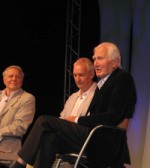Warwick Pugwash Society and Warwick Politics Society invite you to a joint event: Remote Control and Contemporary Warfare: Implication and Challenges of Drone Wars Tuesday 23rd February 18.00-19.00
Ethics of Science RSS feed for this section
British Pugwash Newsletter November 2015
Topics include: WMDA Talking Trident and Ambassadors’ programmes; the ethics of developing technologies; Syria’s chemical weapons; Ukraine; relaunching Student/Young Pugwash; global energy calculator
British Pugwash Annual Report 2014
Key topics: developments on the international disarmament scene with major implications for British Pugwash; Trident and the General Election; the Disarmament Institute (BRINDI); science and ethics, including the military robotics debate; UK and European energy policy. Read or download the report (pdf)
The ethics of developing technologies
Two lines of work, on the ethics of military robotics and the potential development of autonomous weapons, have developed since 2013. These issues are highly relevant to Pugwash’s concern with ethical and humanitarian constraints on the conduct of warfare.
British Pugwash Annual Report 2013
Key topics: Trident renewal, NPT Reaching Consensus project, the Disarmament Institute (BRINDI), and continued work on verification of disarmament; new science and ethics focus on the military robotics debate; developing work on UK energy policy; International Pugwash 60th conference

Science, Politics and Ethics – Are they compatible?
It is a central purpose of Pugwash to communicate with governments about ethical issues that arise from professional scientific activity. In a talk on 28 November 2007 at UCL, Tony Benn reflected on this from a lifetime of political experience.
